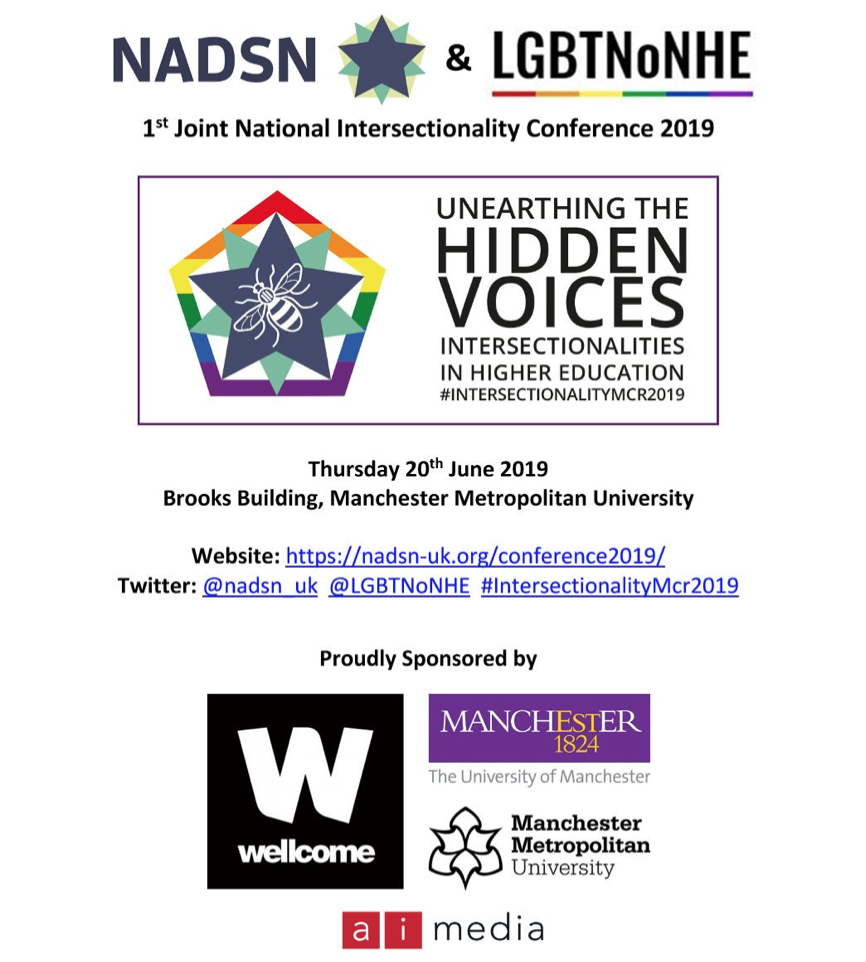On the 20thof June the National Association of Disabled Staff Networks (NADSN) and the LGBT+ Network of Networks in Higher Education (LGBTNoNHE) jointly organised a one day conference, hosted at Manchester Metropolitan University. ‘Unearthing the hidden voices: intersectionalities in higher education’ focussed on the higher education system, but was open to colleagues from any sector with an interest in intersectionality. 150 delegates were welcomed to the event and it made every attempt to foster an inclusive and accessible atmosphere. All talks and presentations had BSL interpreters and were captioned, and though there were some technical issues – as can be expected at any conference – the day went by without hiccup.

The conference had three plenary speakers; David Ruebain, Fiona Kumari Campbell and Stuart McKenna. David, who is Chief Executive of the Conservatoire for Dance and Drama delivered an interesting and challenging address over powerpoint slides using stunning images of dance students. Fiona delivered a tour de force combining her own experiences of being a disabled, BAME lesbian, and her work exploring disability. She offered challenging new ways of looking at the world, talking about ‘majorities’ rather than minorities – in a reflection on who should take responsibility for change. Where David had focused on reducing conflict to promote access and inclusion, Fiona instead permitted anger. The two talks, though not in direct conflict, offered very different, engaging and challenging ideas regarding how to approach intersectionality. The closing plenary was delivered by Stuart McKenna, who focused predominantly on LGBT+ issues, he used statistics and screen shots to engage the audience. All three speakers provided talks that provoked self-reflection in terms of identity, subjectivity and action.
In the morning there was a selection of workshops to choose from. I went to ‘Taking an intersectional approach to Access and Participation Plans: An OFS perspective’. It provided a comprehensive account of the information and data available to explore student access to higher education, as well as offering attendees the opportunity to discuss potential gaps in coverage. Workshop participants were clear that a key lack in available information was that relating to disabled staff, though the organisers explained the specific parameters to their work.
In the afternoon, I co-delivered a workshop; ‘Reimagining academia – Disability Inclusive Science Careers‘ with Marion Hersch who was representing UCU Scotland. The presentation was authored by the presenters, Kate Sang and Jessica Boland. It was informed by data generated by the DISC project, and acted as a form of pilot for some of the training that will be available as part of the project. The workshop was designed to be interactive, drawing on qualitative interview data collected from university staff involved in supporting disabled academics (line managers and human resources staff) and disabled academics themselves. Data was used to highlight how workplace disability is socially and relationally constructed between individuals, and by university procedures and structures.
We introduced attendees to four characters; Alex, Hazel, Michael and Elizabeth, two disabled academics, a senior HR advisor and Head of School/Principal Investigator respectively. Their vignettes were used to stimulate discussion regarding the commonalities and contrasts in participants’ experiences, which extended to explore ways to resist and alter the barriers faced by disabled academics in STEM. We used the vignettes to reimagine staff experiences in the context of immediate alterations, medium-term policy change, and long-term sector-wide culture shifts to conceptualise an inclusive and accessible HE sector. Participants challenged antiquated views in academia relating to the value of disabled and LGBTI staff by exploring the value they add. A key point established by the workshop were that managing a long term condition or disability in an academic setting is nuanced and multifaceted, and not necessarily ‘solved’ by physical alterations to a workstation. There were suggestions from participants that universities should try and maintain consistency across teams like HR and line management to avoid multiple disclosures of health conditions and/or LGBTQI status, that disability champions need to be as ‘high up’ as possible in the university hierarchy, and that universities should introduce systems to capture successes / practical solutions to demystify ‘reasonable adjustments’. The expertise in the room provided a lot of food for thought, as well as swapping of details to keep each other informed. Hopefully, longer term this will lead to extended research parameters and quicken the pace of workplace accessibility for disabled academics.
